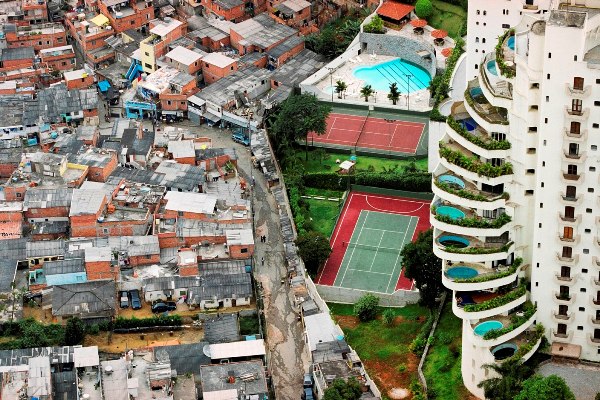
Ciao 90
"Between 2008 and 2013, number of countries with reducing income inequality was twice bigger than number of countries with increasing income", - the World Bank says.
According to the World Bank’s data, number of people living on less than $ 1.9 per day fell to 767 million people (that's 10.7% of the world population) in 2013. For comparison, there were 881 million (12.4%) in 2012, and 1.85 billion (35%) in 1990. Now, almost 650 million of those living in extreme poverty are still concentrated in sub-Saharan Africa and South Asia. The Asia-Pacific region, particularly China and Indonesia, have reached especially significant progress in the fight against poverty.
40% poorest people in 60 of 83 studied countries increased their revenues in 2008-2013. They account for 67% of the world population, says the World Bank. In addition, 49 of 83 countries shortened the income inequality. Among them is the United Kingdom, where the gap between rich and poor has decreased more than in other industrialized countries; the list also includes the US, Germany, China, Brazil and Russia.
World Bank’s findings run counter to the conventional wisdom, said the Financial Times. It was believed that economic growth of developing countries such as Brazil, China and India, has led to a significant reduction of inequalities between states, partially thanks to growing inequality within developed countries. Industrial workers in the latter lost their jobs, and became unable to compete with manufacturers, while the rich become even richer thanks to accumulating financial assets. However, the World Bank report shows factually inequality in many developed countries has decreased.
the World Bank Having found the most effective in countries, which could significantly reduce poverty in recent years (Brazil, Cambodia, Tanzania and others). It consists of investing in nutrition and child development, health services coverage expansion, universal education, and infrastructure in rural areas; cash transfers to poor families and the use of progressive taxation. "Some of these measures might affect inequality quickly, others - more slowly. None of them is a panacea. But their efficiency is supported by strong evidence, and countries have financial and technical capacity to implement many of these measures, "- said president of the World Bank Jim Yong Kim. Kim called "impressive" achievement the fact that countries managed to reduce poverty and inequality in the conditions of weak global economic growth. However, "unless we accelerate the global [economic] growth and reduce inequality, we are risking not to reach the World Bank’s goal - to put an end to extreme poverty by 2030," he warned.
The researchers’ conclusions "destroy the myth," says Francisco Ferreira, responsible for program of poverty study at the World Bank: "While the world's attention was mainly focused on the growth of inequality, there was a quieter process of reduction."
source: ft.com
According to the World Bank’s data, number of people living on less than $ 1.9 per day fell to 767 million people (that's 10.7% of the world population) in 2013. For comparison, there were 881 million (12.4%) in 2012, and 1.85 billion (35%) in 1990. Now, almost 650 million of those living in extreme poverty are still concentrated in sub-Saharan Africa and South Asia. The Asia-Pacific region, particularly China and Indonesia, have reached especially significant progress in the fight against poverty.
40% poorest people in 60 of 83 studied countries increased their revenues in 2008-2013. They account for 67% of the world population, says the World Bank. In addition, 49 of 83 countries shortened the income inequality. Among them is the United Kingdom, where the gap between rich and poor has decreased more than in other industrialized countries; the list also includes the US, Germany, China, Brazil and Russia.
World Bank’s findings run counter to the conventional wisdom, said the Financial Times. It was believed that economic growth of developing countries such as Brazil, China and India, has led to a significant reduction of inequalities between states, partially thanks to growing inequality within developed countries. Industrial workers in the latter lost their jobs, and became unable to compete with manufacturers, while the rich become even richer thanks to accumulating financial assets. However, the World Bank report shows factually inequality in many developed countries has decreased.
the World Bank Having found the most effective in countries, which could significantly reduce poverty in recent years (Brazil, Cambodia, Tanzania and others). It consists of investing in nutrition and child development, health services coverage expansion, universal education, and infrastructure in rural areas; cash transfers to poor families and the use of progressive taxation. "Some of these measures might affect inequality quickly, others - more slowly. None of them is a panacea. But their efficiency is supported by strong evidence, and countries have financial and technical capacity to implement many of these measures, "- said president of the World Bank Jim Yong Kim. Kim called "impressive" achievement the fact that countries managed to reduce poverty and inequality in the conditions of weak global economic growth. However, "unless we accelerate the global [economic] growth and reduce inequality, we are risking not to reach the World Bank’s goal - to put an end to extreme poverty by 2030," he warned.
The researchers’ conclusions "destroy the myth," says Francisco Ferreira, responsible for program of poverty study at the World Bank: "While the world's attention was mainly focused on the growth of inequality, there was a quieter process of reduction."
source: ft.com


















